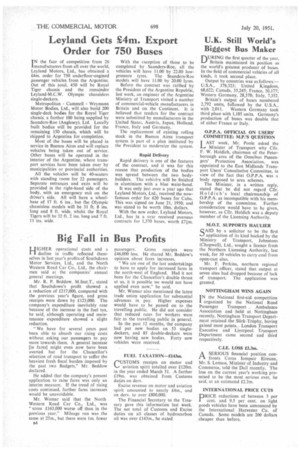Big Fall in Bus Profits
Page 38

If you've noticed an error in this article please click here to report it so we can fix it.
HlGHER operational costs and a decline in traffic reflected themselves in last year's profits of Southdown Motor Services, Ltd., and the North Western Road Car Co., Ltd., the chairmen said at the companies' annual general meetings.
Mr. R. P. Beddow. M.Inst.T., stated that Southdown's profit showed a a reduction of £217,000, compared with the previous year's figure, and gross receipts were down by £123,000. The company's expenditure inevitably rose because of the increase in the fuel tax, he said, although operating and maintenance expenditure showed a slight reduction.
"We have for several years past been able to absorb our rising costs without asking our passengers to pay more towards them. A general increase [in fares] might even now have been averted but for the Chancellor's selection of road transport to suffer the heaviest fresh fiscal burden imposed by the past two Budgets," Mr. Beddow declared.
He added that the company's present application to raise fares was only an interim measure. If the trend of rising costs continued, further fares increases would be unavoidable.
Mr. Womar said that the North Western Road Car Co., Ltd., was "some £163,000 worse off than in the previous year." Mileage run was the same at 25m., but there were ltn. fewer 84 passengers. Gross receipts were £46,000 less. He shared Mr. Beddow's opinion about fares increases.
"We are one of the last undertakings to have to apply for increased fares in the north-west of England. Had it not been for the Chancellor's double thrust at us, it is possible we would not have applied even now," he said.
Mr. Womar also mentioned the latest trade union application for substantial advances in pay. Higher expenses would have to be passed on to the travelling public. He did not consider that reduced rates for workers were fair to the travelling public in general.
In the past 12 months, the company had put new bodies on 53 singledeckers, and 85 double-deckers were now having new bodies. Forty new vehicles were received.




















































































